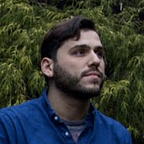Vienna doesn’t wait for me
Judaism is an important part of my identity. Throughout my life, I had heard and learned much about the rich Jewish history in Prague, Vienna, and Budapest, as well as the contributions that Jewish citizens made to these cities and cultures. As I planned my recent trip, I couldn’t wait to see all that history first hand, even though I knew that a major part of that history includes the Holocaust.
My grandmother fled Lithuania in 1930 with a few family members. The Nazis and their collaborators murdered all of our family members that stayed behind. Every Jewish person in Babtai, the village where my grandmother was born, was murdered. Along with 5,000 other Jewish communities commemorated in the Valley of the Communities at Yad Vashem — Israel’s official memorial to the victims of the Holocaust — Babtai now exists in name only.
Home to over 100 museums, I arrived to Vienna excited to experience nearly a millennium of history. 72 hours later I left angry and frustrated; feeling the specter of the Holocaust and 750 years of anti-Semitism hanging heavy in the air.
As I made my way from museum to museum, mentions of Jewish contributions to Vienna’s history or of Austria’s legacy of anti-Semitism were conspicuously few and far between. With such thoughtfully curated museums, this glaring omission felt deliberate.
I did see a few places that mentioned the Holocaust and there is a poignant Holocaust memorial in the Judenplatz — although it is worth mentioning that this memorial was created only after the Jewish community’s loud outcry caused by the humiliating and undignified representation of Jewish men in the previously constructed Monument Against War and Fascism. Aside from the Jewish museums, I saw few references to Jewish contributions to Viennese history and society and even fewer mentions of the times that Jews were exiled, murdered, and burned at the stake.
I compare my experience in Vienna to my time in Prague, where Josefov, the Jewish Quarter, is a living museum to the Jewish people. I also compare my experience to Budapest, a city that has one of the most complicated relationships with the Jewish people.
Before Germany’s invasion in March of 1944, Hungary’s own far-right fascist party, the Arrow Cross Party collaborated with the Nazis. Today, the Hungarian government is strongly committed to telling the story of their role in the Holocaust. There are powerful memorials across Budapest dedicated to the Holocaust and the government helped finance the restoration and renovation of the Great Synagogue following the end of Soviet rule. Additionally, the House of Terror museum commemorates the atrocities committed against Jews and other marginalized groups under fascist and communist rule.
Czechia, Hungary, and Austria all contributed to the Holocaust. Yet on this trip, I felt that Prague and Budapest include the Jewish people in their history in ways that Vienna does not. Vienna’s exclusion of the Jewish story from Viennese history left with me the impression that this unmistakable public omission was purposeful. By sidestepping the painful parts of its history, Austria has left the door open to anti-Semitism. The absence of commemoration is itself a display of approval.
In a 1966 letter to his parents, famous Jewish conductor Leonard Bernstein wrote of the “many ex-Nazis (and maybe still Nazis)” he had to deal with in Vienna. 50 years after that letter, I want to be explicitly clear that I did not face any direct anti-Semitism while in Vienna.
In fact, I had a fine time in Vienna. I spent hours studying gemstones and meteorites at the Museum of Natural History and could feel history in the air while eating at Café Central. To paraphrase Bernstein’s same letter, I enjoyed Vienna as much as a Jewish person can. However, the more I explored the city, the more uneasy, uncomfortable, and frustrated I felt.
It wasn’t until I arrived in Budapest that I could put my finger on why I felt that way. Comparing the three cities that I had visited, I realized that as I walked around Vienna, I strongly felt that I was the “other,” that I did not, and was not meant to, belong.
Many countries and cultures have shameful legacies in their pasts. I believe that we can not and should not hold contemporary people and societies responsible for the evil of their predecessors or the sins of their ancestors.
I also believe that it is the responsibility of contemporary societies to acknowledge and to claim the atrocities in their past; to actively educate about these shameful periods and to tell the stories of communities that were brutalized and marginalized.
If marginalized groups are solely responsible for telling their story, they will forever remain marginalized. Otherwise, the majority sets the status quo. Therefore, if there is a true desire for equality, inclusion, and justice, the majority must participate in educating about, and telling the story of, marginalized groups.
My hope is that by discussing humanity at our very worst, together, we can prevent similar atrocities and injustices from reoccurring today.
Billy Joel famously sang that “Vienna waits for you.” Waiting for someone is an intentional act; a conscious decision to make an effort to include someone in the present.
Telling of history is a similar act. The history writers decide what role communities played and how groups are included in the present. History is written intentionally and historians make an effort to decide who and what is and isn’t part of the story. After spending time in Vienna, I feel compelled to edit Billy Joel’s famous lyric.
Vienna waits for you…unless you are Jewish.
Have you been to these cities as well? What was your experience like? Do you think my experience was an anomaly or off base? I’d love to hear what you think in the comment section or on twitter @EliKamerow
